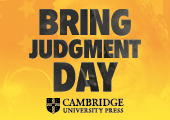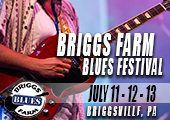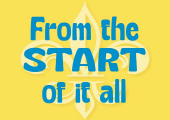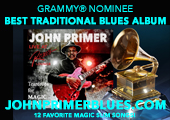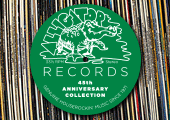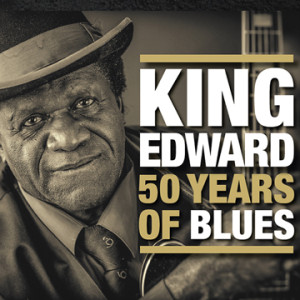 KING EDWARD
KING EDWARD
50 Years of Blues
Hit The Road – No #
“King” Edward Antoine is based in Jackson, Mississippi, these days, but some may remember him from his long tenure in Chicago, where he often worked alongside his brother, vocalist Nolan Struck. Born in Louisiana, Edward has a distinctive guitar style that sometimes shows the influence of zydeco, which he learned from his cousin Clifton Chenier. Mostly, though, he’s a straight-ahead bluesman whose music is heavy on B.B.-like string bending and declamatory, juke-raw chording; his unforced vocals provide a relaxing contrast to the fierce-toned intensity of his fretwork.
This set feels like a Saturday night at the local juke, and that’s meant to be a compliment. Edward and his accompanists (who are listed on the sleeve but, frustratingly, not identified in terms of who plays what) charge through myriad stylistic influences—rough-hewn funk, deep-pocket boogie blues, thudding blues rock, even country and western—yet they nonetheless retain their deep blues feel. The fare is appropriately eclectic, ranging from a few originals co-written by Edward (and one by brother Nolan) through standards like You Don’t Love Me (credited to Bo Diddley instead of Willie Cobbs); Lightnin’ Hopkins’ Mr. Charlie (minus Lightnin’s famous introductory narration); and a stripped-down version of Merle Haggard’s Today I Started Loving You Again (a definitive example of the stylistic and thematic kinship between blues and honky-tonk country).
This is the kind of no-nonsense, from-the-heart blues that tourists regularly travel thousands of miles to experience on its home turf, whether in Mississippi or on the West Side of Chicago—an endangered musical species, perhaps, but alive and well as long as under-recognized artists like King Edward remain in action.
—David Whiteis
SUPER CHIKAN
Organic Chikan—Free Range Rooster
Chikan Howse Productions – No #
“If you’re looking for the blues, then you must see me,” James “Super Chikan” Johnson sings on Symptoms of a True Bluesman, a track from his latest release—and Super Chikan is surely one of the truest and finest of modern times. The ageless Clarksdale-based artist and instrument maker deftly combines classic blues styles with latter-day lyrical sensibilities, and on Organic Chikan—Free Range Rooster he’s as delightfully cocky as ever.
Jeromy Spires produced the spare-sounding album (Valjawan Deer is executive producer), and Spires also provided multi-instrumental support for Chikan’s vocals and guitar and harmonica playing. Chikan kicks off with the stomp and strut of Rooster Juice, complete with crows, clucks and spiky riffs. The shimmying Free Range and racy but fun Twerk It (“She ain’t no Miley, but she sure got me smilin’”) are dance floor ready. Chikan recites a litany of everything blue in his life on the slow shuffle Tired of the Blues but never loses his sense of humor (“I even got a dog named Blue”).
The ambling instrumental In the Mean Time gives way to Work Train, a propulsive portrait of life and labor in the Delta cotton fields. Take Me in Your Kitchen is full of delicious, lusty double entendres and licks (“I got the butter, just open up your biscuit”), while on Blood, Fight and Wooze, Chikan uses military jargon to describe the blues business (“I’m at war with the blues”). The Untold Story is a loping, voodoo-steeped recasting of the tale of Robert Johnson and the birth of the blues. He recounts an eventful visit to the Middle East on the traveling Tel Aviv, and how he and his brothers made music as children on the percussive, a cappella African Style.
A hot helping of homegrown, contemporary Delta blues, Super Chikan’s Organic Chikan—Free Range Rooster is served fresh and made to order.
—Melanie Young
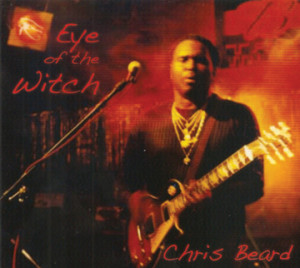 CHRIS BEARD
CHRIS BEARD
Eye of the Witch
Destin – 1015
Rochester, New York, guitarist Chris Beard’s career got off to a promising start with two CDs for JSP in 1997 and in 2001, but it was derailed when he suffered a stroke shortly after the release of his 2005 recording for Northern Blues. Forced to adapt his guitar style to compensate for the residual effects of the stroke, he arrived back on the scene in impressive fashion with 2010’s Who I Am and What I Do for Electro Glide. Another five years passed before this latest release on his own Destin imprint.
Like its predecessor, this album was produced by Carlton Campbell, a member of the sacred steel Campbell family, who also contributes some of the keyboard, bass and drum parts. In contrast to his JSP debut, Beard’s guitar work is more reminiscent of Albert King than B.B., as is evident from the opening original Let the Chips Fall. The title track that follows is appropriately atmospheric, and House of Shame, one of several tracks penned by Alan Mirikitani and Dennis Walker, keeps things at a low simmer before the sinuous mid-tempo One More Cry for Love. Beard’s dad, Joe, the reigning patriarch of the Rochester blues scene, joins in to boogie with the young folks on his son’s Older Fool, and there’s a touch of James Brown on Love Comes Knocking. The down-tempo Glad You’re Gone and I’m Free show the Albert King influence, and Crime of the Century is a sardonic slice of modern funk, while Good Thing’s About to Run Out is an updated stop-time shuffle, and Keeps Me Believing closes the set on a reflective note.
Though no longer one of the music’s young guns—he was born in 1957—Eye of the Witch is further proof that Chris Beard remains a force to be reckoned with on today’s blues scene.
—Jim DeKoster
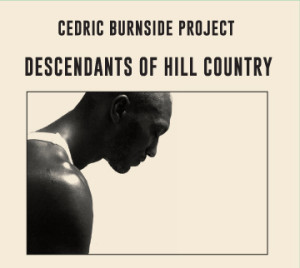 CEDRIC BURNSIDE PROJECT
CEDRIC BURNSIDE PROJECT
Descendants of Hill Country
No label – No #
Why isn’t Cedric Burnside better known than he is? In an age when aficionados decry the dearth of “real-deal” younger generation blues artists and the diminution of the African American blues tradition, Burnside stands as a one-man refutation of all the pessimism, melding the famous “trance-blues” modal style of his grandfather, the late Mississippi Hill Country guitar shaman R.L. Burnside, with modernist influences—deeply rooted, yet charged with a nearly transcendent feel of adventure and discovery. If Jimi Hendrix had been raised in Holly Springs, Mississippi, and learned music at his grandfather’s knee in Junior Kimbrough’s juke, he might well have sounded something like this.
Burnside plays both drums and guitar here. His bandsmen—Trent Ayers (guitar) and Cedric’s uncle, Garry Burnside (guitar, bass, drums)—are as deeply immersed in the Hill Country tradition as he, and together they evoke the kind of synergy that’s often hailed as “authentic” (and sometimes, patronizingly, as “instinctive”) but actually derives from carefully honed artistic craftsmanship. The song titles—Born With It, Don’t Shoot the Dice, Front Porch, Down In the Delta, Hard Times, et al.—set the mood; the music itself is raw, yet laced with a deeply textured refinement of spirit as elusive as it is palpable (especially on outings like You Just Wait and See and Skinny Woman, both of which feature feathery acoustic guitar picking).
Burnside’s voice might surprise listeners who equate blues expression with bombast—even at his most intense, as on the topical That Changes Everything, he conveys deep feeling through understatement rather than overkill (again the Hendrix analogy is appropriate). That voice, unforced yet shot through with emotion and hard-won experience, reflects the eloquence of Burnside’s lyrics and the message of his music—the essence of blues expression: hard-living, hard-loving, refusing to admit defeat and bound for freedom.
—David Whiteis
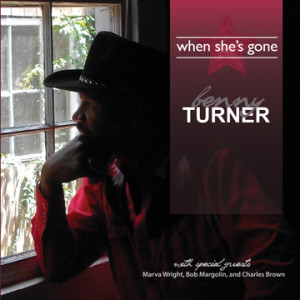 BENNY TURNER
BENNY TURNER
When She’s Gone
Nola Blue – NB002
When Texas-born bassist, vocalist and songwriter Benny Turner and his brother, the late blues guitarist Freddie King, learned to play music as children, one of their teachers was their mother, Ella Mae King Turner. Turner’s latest release, When She’s Gone, is dedicated to her memory, and it compiles previously released and newly recorded tracks into a seamless, superb whole.
Six of the album’s ten songs first appeared on Turner’s 1997 solo debut, Blue and Not So Blue. Samuel “The Bishop” Berfect’s keyboards lend sparkle to I Can’t Leave’s tale of love gone wrong. Turner was Marva Wright’s bandleader for over two decades, and the funky Pity on This Lovesick Fool—with Davell Crawford on organ and Fender Rhodes—captures their joy in performing together. The beautiful Because of You features Dr. John’s gently simmering rhythm guitar; the passionate If I Can’t Have You rocks with gospel fervor. The late Charles Brown’s elegant piano graces the stirring So Deep; this song and the 3 a.m. blues of Have You Ever Been So Lonesome also spotlight Turner’s soulful bass playing. All of these tracks were written by Turner, who possesses a strong songwriting voice steeped in the blues he’s played all of his life—not to mention his warm, commanding singing voice.
Four recently cut covers round out When She’s Gone. Bill Withers’ Ain’t No Sunshine, from which the album takes its title, is infused with deep longing and sadness. Guitarist Bob Margolin’s subdued slide cuts like a knife here, and on Lowell Fulson’s Reconsider Baby he plays tasteful call-and-response leads to Turner’s vocals. Turner picks sharp lead licks on Jimmy Rogers’ That’s Alright—I’ll Get Over You, and his stunning, personalized version of Jessie Mae Robinson’s Black Night—a 1997 recording with Charles Brown thought claimed by Hurricane Katrina’s floodwaters—is harrowing.
Full of timeless, first-rate performances, Benny Turner’s When She’s Gone is a welcome collection from a modern-day blues master.
—Melanie Young
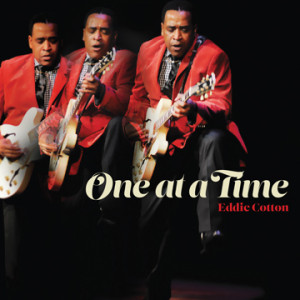 EDDIE COTTON
EDDIE COTTON
One at a Time
DeChamp – DC100315
One at a Time is Eddie Cotton’s fourth release—his second on Grady Champion’s DeChamp label—and like the second, features superior, all-original material to accompany his broad-ranging voice and crisp and judicious guitar playing. Cotton, who took top honors in the 2015 International Blues Challenge in Memphis, is a truly significant talent who has yet to break out to audiences beyond his Jackson, Mississippi, environs.
Fortunately for blues listeners, Cotton finds no conflict between the blues and soul he plays on stage and the music he makes in his father’s church in Clinton, Mississippi, where he serves as music minister (he even references his father’s preaching in Hard Race to Win). In fact, his parable-like lyrics are themselves mini-sermons of a sort, and his considerable vocal and guitar performance is delivered with a clergyman’s command of his flock.
He leads off with a track that emphasizes his instrumental skills—with a searing, trebly guitar. However, his best tracks, that balance his guitar, vocals and songwriting, are found in the middle and tailing spots of the set. The old-school soul of Ego at Your Door and Dead End Street, which evokes Ronnie Lovejoy’s Sure Wasn’t Me, and the funk-tinged Catch I Wanted, sounding like a song Bobby Rush might have written, best display Cotton’s substantive songwriting and soulfully invested vocals.
Cotton displays a master’s touch with clever wordplay and deft phrasing, and in fact, he can’t help but chuckle at his own lines on the sexually frisky War is Over, and even cracks up other studio personnel on Better Deal.
Filling Me With Pleasure and Je Ne Sais Quoi, with strong hooks and practiced pacing, are additional examples of his advanced craftsmanship. Mississippi is a bit of upbeat boosterism for his home state featuring some of his B.B. King style picking.
The songwriting is foremost throughout (as it should be), with the horns, backup singers, harmonicas, organ and even his fine guitar work subservient to the needs of the song. Most of his guitar soloing is featured toward the ends of tracks and often as a fade out, leaving the listener desirous of more.
And more is what we will all want to see and hear of Eddie Cotton, who is sumptuously entertaining from all angles.
—Justin O’Brien
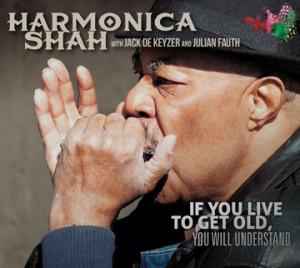 HARMONICA SHAH
HARMONICA SHAH
If You Live to Get Old, You Will Understand
Electro-Fi – 3447
Detroit blues heavyweight Harmonica Shah has once again teamed with guitarist Jack de Keyzer and pianist Julian Fauth for his sixth Electro-Fi album, If You Live to Get Old, You Will Understand. The original material mined for this 12-song set is vintage Shah that reflects the earned wisdom hinted at in the CD’s title. The chugging shuffles and slow-grinding blues that dominate the record all channel narratives about the human condition, and although the archetypes they feature are familiar, they are no less compelling. Shah, a master storyteller, weaves together tales of alcoholics, drug addicts, cheaters and the forlorn, and injects humor in unexpected places.
One example is the hilariously titled Congratulations, That New Love You’ve Got Is My Wife. Here Shah spins a routine yarn about a cheating spouse, only with a twist: rather than chastise his wife for her infidelity, the song’s protagonist wears it on his sleeve like a badge of pride, boasting, “you know she likes your greenbacks, mister, but down in her heart she only loves me.”
Elsewhere the tone is more serious. On Deep Down In the Dark Shah teams with Fauth for a piano-harp duet in which he warns his lover, “This is the last time I throw my life raft out to save you / You’ve got me trapped in quicksand / The more I wiggle, the more I sink down.” Shah’s lyrics rarely rhyme, but they’re always conveyed with deep feeling, and Fauth, a veteran in his own right with three solo releases on Electro-Fi, accompanies him with style and grace.
And what a band—the musical camaraderie between everyone in the studio is palpable. When Shah implores Keyzer to “pick the hell out of it!” on the slow lament I Just Don’t Want You No More he answers in kind, laying down a caustic slide guitar solo devastating enough to strip paint off a wall. As for Shah, his vocals are as confident as ever, and over the years he has settled comfortably into a second-position style on diatonic harmonica that, while not necessarily inventive, still packs an old-school punch with deep rhythms, thick octaves and the occasional high note blow bend. Aspiring harp players will find much to emulate in his approach, and fans of postwar blues will likewise enjoy the uncompromising realism of Shah’s blues.
—Roger Gatchet
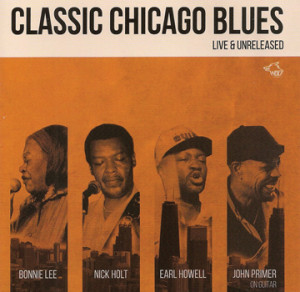 BONNIE LEE, NICK HOLT, EARL HOWELL, JOHN PRIMER
BONNIE LEE, NICK HOLT, EARL HOWELL, JOHN PRIMER
Classic Chicago Blues, Live & Unreleased
Wolf Records – 120.835
In 1992, Magic Slim and the Teardrops featured Chicago-based vocalist Bonnie Lee as a special guest on a European tour; the Bonnie Lee tracks here were recorded then. The tracks featuring Teardrops bassist Nick Holt and drummer Earl Howell come from other European sojourns the band made in the early and mid-’90s.
The overall sound is vintage Teardrops—raw, boogie-charged, and redolent of backstreet funk, whiskey and cigar smoke. Bonnie Lee comes through with some characteristically gritty yet graceful performances—despite her often stated affection for vocalists like Sarah Vaughan and Dinah Washington (“I’m on a jazzy-bluesy kick,” she once told an interviewer), she was primarily a rough-and-ready shouter who leavened her raucous sound with occasional timbral and rhythmic nods to her heroines. Aside from Tryin’ to Make a Livin’ (co-written by legendary Chicago entrepreneur Narvel “Cadillac Baby” Eatmon) and her anthem I’m Good, Lee’s set consists of well-known standards that she delivers with the fusion of lovability and sass that made her a Chicago-area favorite for so many years.
Nick Holt was a soul-tinged vocalist who was at his best when he wasn’t encumbered with the task of singing and playing bass at the same time. Here he tackles that challenging dual role with gusto: he attains a dark-hued pathos on As the Years Go Passing By; his take on McKinley Mitchell’s 1962 hit, The Town I Live In, despite his occasionally labored phrasing and timbre, conveys an effective blend of bluesy intensity and deep-soul longing. Earl Howell showcases a muscular, expressive blues delivery on the slow rollers and loping grinders—a few Jimmy Reed chestnuts, Bobby Sharp’s I Cried Like a Baby (a longtime standard in Koko Taylor’s repertoire)—that he chooses to feature here.
“Classic” may be stretching things a bit, but these earnest vocal performances by two sidemen and one under-recorded chanteuse should please fans of the latter-day Chicago sound.
—David Whiteis
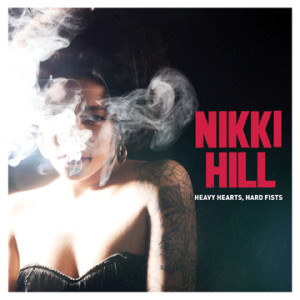 NIKKI HILL
NIKKI HILL
Heavy Hearts, Hard Fists
Deep Fryed Records – No #
Though she has only been performing for a few years now, North Carolina-native Nikki Hill possesses the confidence and chops of a much more seasoned artist. The New Orleans-based vocalist and songwriter’s latest release, Heavy Hearts, Hard Fists, follows her 2013 full-length debut, Here’s Nikki Hill, and it’s a cracking collection of vintage, rocking R&B and soul.
Hill’s frayed-silk mezzo possesses sugar’s sweetness and grit, and her husband Matt Hill’s energetic guitar playing is a fine foil for her spirited performances. The title track and Mama Wouldn’t Like It are loaded with smooth, no-nonsense swagger. She channels Little Richard on Oh My, (Let Me Tell You ’Bout) LUV and Scratch Back; the latter two tracks feature frenetic piano pounding from Matt Farrell. Struttin’ and HotShot evoke the Rolling Stones, and guitarist Hill reels off blasted, crunchy riffs on both. And I Wonder’s moody rhythms and the languid ballad Nothin’ With You are tailor-made for dancing. A faithful rendition of Eddie Taylor’s I’m Gonna Love You and an enthusiastic take on Sam Cooke’s Twistin’ the Night Away keep good company with Hill’s original songs.
With her velvet-glove voice and bold retro style, Heavy Hearts, Hard Fists marks Nikki Hill as one to watch.
—Melanie Young
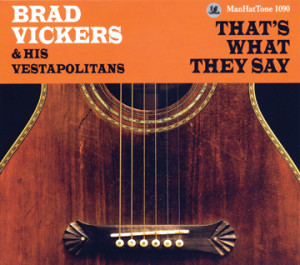 BRAD VICKERS & HIS VESTAPOLITANS
BRAD VICKERS & HIS VESTAPOLITANS
That’s What They Say
ManHatTone – 1090
Brad Vickers has performed with a list of musical luminaries that includes Chuck Berry, Bo Diddley, Odetta and Pinetop Perkins—and it shows. That’s What They Say, the latest from the New York City-based guitarist and singer-songwriter and his band, the Vestapolitans, amply demonstrates their mastery of various roots music forms.
The first two tracks on the album are a pair of covers. Vickers’ nicely fluid bottleneck playing drives a mid-tempo version of Tampa Red’s Seminole Blues. He acquired the traditional Don’t You Love Your Daddy No More from Lead Belly, and the ensemble douses it with a New Orleans strolling-band flavor, garnished by Jim Davis’ clarinet.
The remainder of the record is composed of originals in a variety of styles, such as the jaunty, fiddle-laced country of If You Leave Me Now, Mountain Sparrow and Wishing Well (the latter inspired by folk musician and teacher Charity Bailey). One could imagine Jimmie Rodgers singing Everything About You is Blue, Jimmy Reed the slinky title track or Fats Domino The Secret. Vickers’ and bassist Margey Peters’ angular vocal blend comes to the fore on the honking-sax raver Another Lonesome Road and the breezy Twenty-first Century Rag. Fightin’ is arranged in the manner of an a cappella gospel quartet, adorned by Mikey Junior’s sinewy tenor. The percolating ode Mama’s Cookin’ will make you hungry with its culinary descriptions, and the Gypsy ballad In for a Penny, with harmonies courtesy of Peters, Christine Santelli and Gina Sicilia, is haunting.
Brimming with carefree cool, That’s What They Say is a handsome addition to Brad Vickers and His Vestapolitans’ catalog.
—Melanie Young


